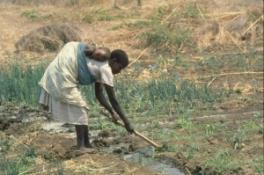 The Hunger Project is proud to be a part of the UN’s Zero Hunger Challenge (ZHC). ZHC is a global declaration that “invites all nations to work for a future where everyone enjoys their right to food and all food systems are resilient.” To ensure the end hunger and access to nutritious food for all, ZHC asserts five goals, including zero stunted children less than 2 years old.
The Hunger Project is proud to be a part of the UN’s Zero Hunger Challenge (ZHC). ZHC is a global declaration that “invites all nations to work for a future where everyone enjoys their right to food and all food systems are resilient.” To ensure the end hunger and access to nutritious food for all, ZHC asserts five goals, including zero stunted children less than 2 years old.
Zero Hunger Challenge launched their new blog this week with a post from our Executive Vice President John Conrood.
Below is an excerpt from John’s post “Zero Hunger: A Challenge of Gender and Democracy:”
Hunger will persist as long as society teaches little girls to eat last and least – saving the best for the men and boys – and as long as girls are married off too young, and have children before their bodies are fully developed and while they are malnourished in pregnancy.
In Africa, women grow the majority of the food – yet get the smallest share of extension services, farm inputs and agricultural credit. As Kofi Annan once famously said – “if there is to be a green revolution in Africa, it must be a gender revolution.”
All five elements of the Zero Hunger Challenge have gender discrimination as a root cause: (1) Zero stunting requires halting child marriage and improving maternal nutrition, (2 and 3) Doubling the productivity and income of small farmers and ensuring full-time access to nutritious food means ending the gender barriers faced by women farmers, (4 and 5) Zero waste and sustainable food systems means ensuring political voice to the women who are the traditional environmental stewards.
The Hunger Project spent several years listening to the leading feminist thinkers in each region where we worked to discover what the highest leverage interventions would be for transforming gender relations.
